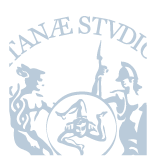
Molecular And Health Biology Master degree
Molecular and Health Biology
Type of course Master Degree
E-mail: biomolsal@unipa.it
Attendance method In presence
Type of access Planned
Qualifying course No
Seat of international agreements - Joint degrees - Molecular And Health Biology Master degree (ENG)
What is the objective of the course? What is it?
What does it train you for?
The Master Degree in Molecular and Health Biology completes the training in biology begun with the Bachelor Degree in Biological Sciences. Attendance at the learning activities is mandatory, and the minimum attendance requirement for admission to the final exam is 75% of lessons. The Master Degree trains graduates with an advanced preparation program to give scientifically and professionally comprehensive answers to various biological problems using modern biomolecular techniques. The Master Degree offers the opportunity to acquire skills regarding cellular, biochemical and physiological processes in prokaryotes and eukaryotes, including humans, as well related to the causes of human health alterations at the molecular, cellular, and organ levels.
What do you learn?
The Master Degree program in Molecular and Health Biology will provide graduates with a deep background in molecular, genetic and cellular techniques and knowledge of factors that can affect human health. The student will have the opportunity to choose a degree course expanding their insight into the cellular and molecular aspects of biology or a degree course in which he/she will acquire more knowledge on the factors that can affect human health. Students will acquire laboratory skills thanks to the significant experimental activity carried out during the 2nd year of the Master Degree (thesis internship). Knowledge of the topics listed above is achieved by the students attending lessons and through self-study
What can you do with it?
Graduates will be able to use the knowledge acquired during the Master Degree course both in basic research laboratories and in laboratories in the health sector (environmentalist, nutritionist, pharmacology). Graduates can use their skills in the sectors of industry, health and public administration as well as in private analysis laboratories and in the scientific communication field. The Master Degree is a valuable cultural basis for gaining access to many PhD programs in the field of Life Sciences.



